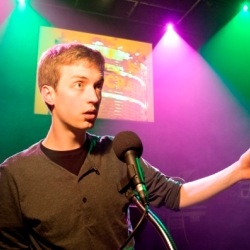Catherine Love: Art as a weapon?

© Niall Walker
The claim that all theatre is political has become something of a truism – and an empty truism at that. Accurate as it might be to recognise that all shows are inevitably shot through with a politics of some kind, if all politics in art is relative, where does that leave work that sets out with a clear political aim? And as the traditional vocabulary of political theatre dries up, what is the best way of being political in today’s theatrical landscape?
These are questions that seem to have been injected with new life in recent years. The imperative for artists to attempt to change as well as reflect the world they live in has been argued about for as long as art has been around, but right now the debate seems to have intensified once again. Just one example is the situation in Russia, where discussion has erupted over the role of artists in opposing Putin’s current attack on gay rights, but similar dilemmas also face theatre-makers in the UK.
Writing for this site following last year’s Edinburgh Fringe, Honour Bayes suggested that theatre-makers need to go “literally left field” to circumvent the staleness of traditional political language and the feeling of helplessness that modern politics can so often create. One of her examples was Kieran Hurley‘s touring show Beats, a thrilling piece of storytelling about the rave movement in the 1990s. Though set in 1994, and while it never says as much, the show also manages to obliquely address how our civil rights continue to be encroached upon today.
Another approach is to view the political through the lens of the personal. One of the most successful and affecting examples of this I’ve seen is Hannah Nicklin‘s A Conversation with my Father, which appeared at Edinburgh this year and will soon be touring again. By looking at protest through a discussion between Nicklin (a protestor) and her father (a policeman), the show allows audience members to reflect on their own relationships with politics, adopting an indirect approach with real honesty and eloquence.
It’s intriguing, therefore, to see a current set of events tackling politics much more directly. The Paul Robeson Art is a Weapon Festival, a programme of performances and talks running at the Tristan Bates Theatre this month, puts its attitude right there in its name. This explicitly political festival is inspired by the life of actor, singer and campaigner Paul Robeson, who saw his art very much as a tool for his politics. This was particularly evident in watching Call Mr Robeson, a monologue by Tayo Aluko, which very deliberately marries Robeson’s art and politics in telling the story of his life.
Watching these three pieces of theatre alone, each approach has its own unique strengths, and none feel wedded to the rhetoric of politicians that has become so tainted in recent years. Deciding between these different methods is something of a false choice and none of this debate is going to suddenly resolve theatre’s complicated relationship to politics. But some healthy discussion about art’s role in the world can hardly be a bad thing.
See Also: Tayo Aluko on performance and protest










